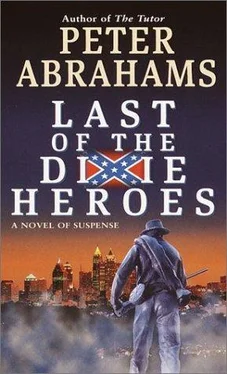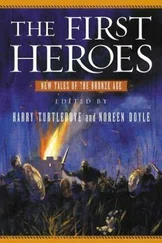Peter Abrahams - Last of the Dixie Heroes
Здесь есть возможность читать онлайн «Peter Abrahams - Last of the Dixie Heroes» весь текст электронной книги совершенно бесплатно (целиком полную версию без сокращений). В некоторых случаях можно слушать аудио, скачать через торрент в формате fb2 и присутствует краткое содержание. Жанр: Триллер, на английском языке. Описание произведения, (предисловие) а так же отзывы посетителей доступны на портале библиотеки ЛибКат.
- Название:Last of the Dixie Heroes
- Автор:
- Жанр:
- Год:неизвестен
- ISBN:нет данных
- Рейтинг книги:4 / 5. Голосов: 1
-
Избранное:Добавить в избранное
- Отзывы:
-
Ваша оценка:
- 80
- 1
- 2
- 3
- 4
- 5
Last of the Dixie Heroes: краткое содержание, описание и аннотация
Предлагаем к чтению аннотацию, описание, краткое содержание или предисловие (зависит от того, что написал сам автор книги «Last of the Dixie Heroes»). Если вы не нашли необходимую информацию о книге — напишите в комментариях, мы постараемся отыскать её.
Last of the Dixie Heroes — читать онлайн бесплатно полную книгу (весь текст) целиком
Ниже представлен текст книги, разбитый по страницам. Система сохранения места последней прочитанной страницы, позволяет с удобством читать онлайн бесплатно книгу «Last of the Dixie Heroes», без необходимости каждый раз заново искать на чём Вы остановились. Поставьте закладку, и сможете в любой момент перейти на страницу, на которой закончили чтение.
Интервал:
Закладка:
“You’re not horning in.”
Gordo leaned over, squeezed Roy’s shoulder. “No offense?”
“None.”
Gordo’s face was close to Roy’s. “You’re a good buddy,” he said, then thought of something and smothered a little laugh. “Poor Brenda.”
“Why do you say that?”
“She’s embarrassed.”
“Nothing to be embarrassed about.”
Gordo smiled, a confidential sort of smile. Roy smelled tooth decay. “You know what they don’t tell you about life back then?” Gordo said.
“What?”
Gordo’s eyes shifted. Curtis was walking by. Gordo straightened, said, “Thanks for the help,” a little too loudly, slipped a manila envelope onto Roy’s desk in what he must have considered a deft maneuver, and left the cubicle, knocking against the padded wall on his way out. Roy recalled how he’d moved in uniform, only the day before.
He opened the envelope. Inside were two black-and-white photographs and a two-page computer printout entitled “Roy Singleton Hill-A Biographical Sketch.” The attached Post-it read: “Dug this up last night. Enjoy-J. Moses.”
The first photograph: Roy and Earl posing by the cannon. Was this like a real Civil War photograph by Matthew whatever his name was? Not to Roy. He and Earl looked silly, that was all. But the second photograph, the one with Lee, was different. Roy and Lee stood side by side with their arms around each other, the way the photographer said the soldiers often posed. For some reason, this one wasn’t silly, not the photograph as a whole, not Lee, and not Roy, even though he was wearing exactly what he’d worn in the first shot, snapped only a minute or two before.
Roy dug out a magnifying glass he had in the drawer, left over from when they dealt in printed labels. His own expression was the same in both pictures, that face he always wore in photographs, angled toward the camera like a cooperative subject, but uneasy. Roy was surprised to see that Earl looked fierce, his eyes hooded under the shadow of the huge brim of his hat, as though sending the signal-to Sherman? Grant? — that he was not to be messed with. Only Lee seemed unaware of the camera; his eyes gazed into the farthest distance, and as Roy examined them, he thought he detected something like battle weariness, as though Lee were a veteran of bloody campaigns that had changed him forever.
“What have you got there?” Curtis, in the cubicle. For a moment Roy thought Curtis might have been talking into his headset; but Curtis’s eyes were on the pictures. Roy noticed for the first time the Confederate flag flying over a tent on the far side of the cannon.
“That you, Roy?” He tapped a pencil on one of the photographs.
“Not really.”
Curtis looked down at him, his eyes narrowing. Curtis had this sense of dignity, didn’t like anyone jerking him around, even when sometimes they weren’t. But Roy wasn’t thinking about that: he was noticing the way Curtis’s narrowed-eye expression resembled Earl’s hooded eyes in the picture.
“Not the real you?” Curtis said.
“I was just visiting,” Roy said.
“Like in Monopoly?”
“It was one of those reenactment camps. I guess you could say a kind of a game.”
“And?” Curtis said.
Roy sensed he was being asked to say something negative about the reenactors, or the camp, or that stupid flag. He did think the whole thing was pretty stupid but he said nothing. He just wasn’t going to do it.
“Kind of a game,” Curtis said. “Did you know they’ve got World War Two reenactors now? Some of the participants dress up in black SS uniforms.”
“That’s weird.”
“Is it?” Curtis said. His eyes shifted. He listened to something coming over his headset, pressed the button, said, “Malabar,” clicked off. He focused on Roy. “Heard of slave reenactors?” he said.
“No.”
“They’re out there too.”
“Doing what?”
“Playing the slave game. Would that be the term, Roy? Supposed to be a big contingent of slave reenactors going up to Chattanooga for some Lookout Mountain event. Never used to see the point of it myself.”
“But now?”
“Now?” Curtis said, and seemed about to go on when another call came over the headset. He nodded at whatever was being said, started backing out of the cubicle, then remembered something, came back, and handed an audiocassette across the desk.
He’d been gone for ten seconds when Gordo looked over the wall. “What was that all about?”
“Did you know there were slave reenactors?”
“Don’t start.”
“Don’t start what?”
“The war had nothing to do with slavery, Roy. Everyone knows that.”
“Like who?”
“Historians. Ask any reenactor, North or South. Talk to Jesse. Or Lee. He’s just as sharp, you get to know him.”
“You’re telling me that if there’d been no slavery, there still would have been a war?”
“Yeah.”
“You’re starting to scare me, Gordo.”
“What the hell’s that supposed to mean?”
Gordo’s face, hanging over the partition, was flushed. “Got to get back to work,” Roy said.
Gordo didn’t move. “What’s that tape Curtis gave you?”
Roy glanced at the label: Managing in a Complex World: The Acclaimed Five-Step Program for Managers in the New Millennium, with Workbook, Internet Support and 24-Hour Hotline.
“No idea.”
“What’s it say?”
There was nothing to do but hand Gordo the tape.
Gordo read the label. “Why’d he be giving you this?” The accent was on you.
“No idea,” Roy said again, but maybe not as convincingly this time.
Roy popped the tape in the car player on the way home.
Why don’t you like filling out the new weekly activity report, Jerry?
Well, Carol, it takes too much time, and who reads it anyway?
I read all the reports, Jerry, and so do the people at headquarters. How much time does it take?
Half an hour, Carol, and that’s time I really can’t spare if I’m going to be a productive member of the team.
In this interchange between Carol and Jerry, we see a common reaction to change, one you’ll probably be faced with sooner or later in your managerial career. What are Carol’s choices? The most common response is what we call the Roy’s mind wandered from the little office drama. His managerial career. Curtis wanted him to know something about handling people, to be ready. The promotion was real, and was coming soon: the tape was tangible proof. Knowing for sure that the future would be better than the present: what a feeling! The next thing Roy knew, he was on the cell phone calling Marcia’s home number.
“Hello?” she said; her voice subdued, even tentative, not like her.
“Doing anything special for supper?”
She perked up right away. That was a good feeling too. “Why, no, Roy.”
“How about I’ll get three steaks, throw them on the grill?”
“Three?”
“You, me, and Rhett.”
Pause. “Right. Sounds good.”
“Give me an hour,” Roy said.
He stopped at the market on the way, bought three sirloin strips, a box of frozen French fries, a bottle of Chardonnay. He knew that Chardonnay didn’t go with steak, but Chardonnay was what she’d wanted the last time.
“What’s your best steak sauce?”
“This here Creole one. Can’t hardly keep it in stock.”
“I’ll take two,” Roy said.
Everything made sense. You worked all day, put good food on the table, sat down together, drank a little wine, the kid said something cute that made you smile at each other over his head, you relaxed, body and soul. Driving up to the house, he began to think about Marcia’s return, her actual moving back in. Should he suggest it, or wait till she brought it up herself? Roy had a funny thought-what would Carol do? Maybe better to think of her as “Carol.” Carrying the grocery bag into the house, Roy decided that this was probably one of those problems that solves itself: step six of the five-step managerial program. He was almost laughing to himself when he went into the kitchen.
Читать дальшеИнтервал:
Закладка:
Похожие книги на «Last of the Dixie Heroes»
Представляем Вашему вниманию похожие книги на «Last of the Dixie Heroes» списком для выбора. Мы отобрали схожую по названию и смыслу литературу в надежде предоставить читателям больше вариантов отыскать новые, интересные, ещё непрочитанные произведения.
Обсуждение, отзывы о книге «Last of the Dixie Heroes» и просто собственные мнения читателей. Оставьте ваши комментарии, напишите, что Вы думаете о произведении, его смысле или главных героях. Укажите что конкретно понравилось, а что нет, и почему Вы так считаете.












